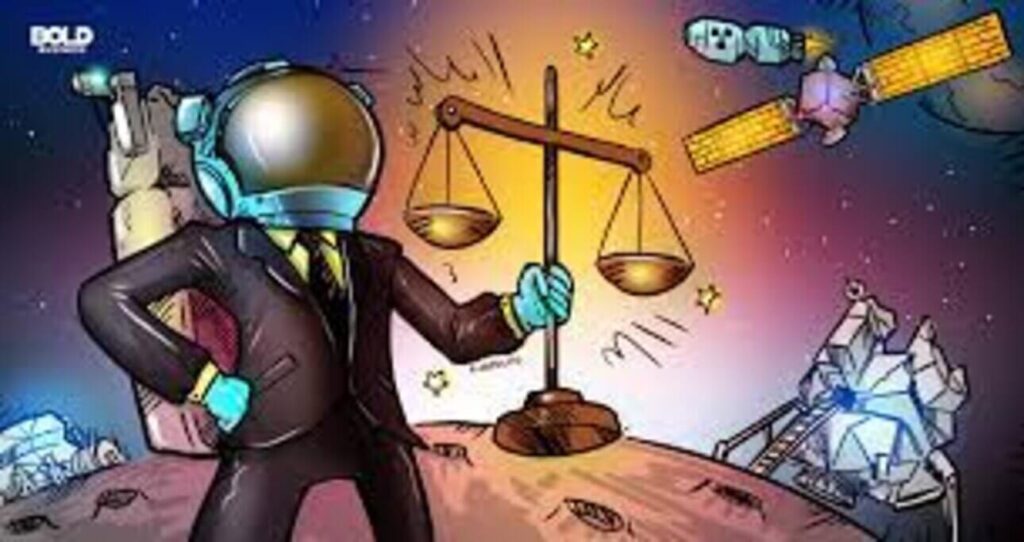INTRODUCTION
Space is everything outside the atmosphere of the blue planet- earth and it is an area of endless possibilities. All the celestial bodies and galaxies along with the Milky Way and everything undiscovered arenas of the unknown defined as Space. In short, space is a vacuum zone where no air to breathe or scattering of light takes place. Law on the other hand is the rule of the land. It is the composition of guidelines, rules, and regulations which help the power holder in governing the citizens. These rules and guidelines issued help the individual find a correct and decent path in the world.
WHO OWNS THE SPACE?
Space is a natural resource that will only harbor any sort of profit to the human only when the knowledge and know-how along with skills are present. Therefore, even though space is owned by none in the broader sense it is currently only being discovered and used by countries and individuals who have enough money to spare and have the means as well as resources for the same.
But this very reason that only the rich have access and control over all the resources and the research conducted in outer space leads to a lot of issues to arise. This is the reason why the need for a set of guidelines that would be able to direct the use of space and more unity in work can take place.
INTERNATIONAL SPACE LAW: THE GOVERNING BODY
Due to the need for quality in the dimension of space the space laws and various treaties governing space-related activities, encompassing both the domestic as well as domestic agreements, rules, and principles came into being. It also addresses the legal issues which are related to satellite communications, navigation, exploration, and exploitation of natural resources in outer space. The most important and recent treaty was signed in 2019.
2019 OUTER SPACE TREATY
The outer space treaty which 108 nations rectified in 2019 states that no nation alone ‘owns’ the space therefore no one can claim to be the sole owner of a property that belongs to the whole of the world. Further, it clearly states that all nations are free players and anyone anytime can go forth with understanding the space and conducting research over it. Also, it terms the ‘envoys of mankind’ as the astronauts and further clarifies that all states must help them in any way possible. Further, the weapons of mass destruction which came to be tested in space during the second war world needed to end. Therefore, Weapons of Mass Destruction (WMD) are prohibited to be tested in space.
The treaty deals with one of the most important cases of debris in outer space which the nations have left there after a successful or failed attempt. All the parts of rockets and satellites are flowing into space and adding more waste in the space thereby making it polluted. But under the 2019 treaty, the member nations have signed off on the fact that they will be responsible for the machinery they send into space in all senses.
THE IMPORTANT AGREEMENTS
Various agreements have been signed by nations all over the world to create a more just and agreeable pact regarding the various space laws. The two most important agreements are:
- The Astronauts Agreement: The Agreement on the Rescue of Astronauts, the Return of Astronauts, and the Return of Objects Launched in Outer Space deals with issues related to devices launched in space as well as the astronauts. It clearly states that the envoys of mankind need to be protected and safeguarded for which all nations are to provide free landings and services to the astronauts in case they land on their soil.
- The Agreement Governing the Activities of States on the Moon and the Celestial Bodies: This agreement clearly states that all celestial bodies inclusive of the moon should not be contaminated and further ensures that the moon is a resource of all of mankind therefore not limited to only powerful or rich states.
CONCLUSION
The international law of space tries to cover all the bases and make it clear that space is not the entity of a single player or nation or even a group of powerful nations rather it is a natural resource yet to be discovered by all for all. International Space Law is the governing body related to the use of space for purposes that are peaceful and ensures that all nations in the globe can have equal access to outer space without any sort of discrimination.
Author’s Name: Charu Kohli (Vivekananda Institute of Professional Studies, Delhi)


